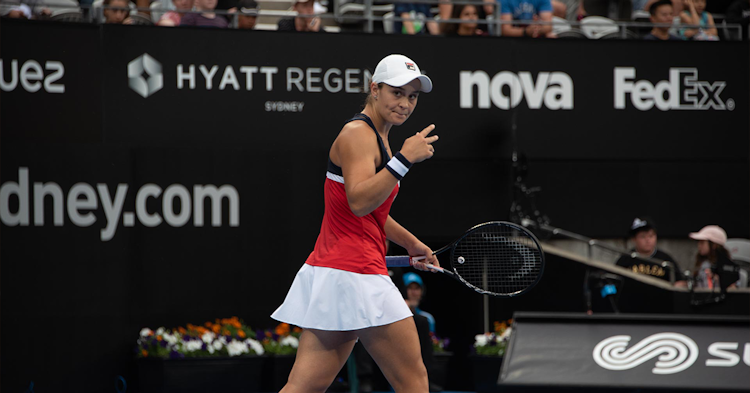This Must Be The Place: Ash Barty Can Now Call Wimbledon Home
Last updated: Jul 11, 2021, 2:34AM | Published: Jul 10, 2021, 11:20PM
This image is a derivative of Sydney International Tennis WTA Premier Sydney, by Rob Keating (CC BY-SA 2.0)
Ashleigh Barty isn’t a tall figure who imposes herself on others, but she towers over the rest of women’s tennis and is the toast of Australia after winning her first Wimbledon title.
That reality forms the basis for a more expansive appreciation of Ash Barty. She certainly has earned it.
I won’t speak for people in other countries, but as an American, I can tell you that the Wimbledon singles final is a moment when casual American sports fans give tennis a look. It’s the middle of summer. NFL football, the most popular sport in our country, is just around the corner.
There’s no implied criticism in being a casual fan. Sports are a matter of taste just as different forms of music are. The point to emphasise about casual fans, however, is that if any of them watched Saturday’s women’s final between Barty and Karolina Pliskova, they might have been unimpressed.
Purely in terms of raw quality, this was an unremarkable match. Barty won 16 of 18 points at the start. Pliskova then won 8 of 10 points. In the second set, Barty went up 3-1 before Pliskova ran off 10 of 11 points.
This was a mixture of brief flourishes followed by noticeable regressions. Neither player sustained a high level of tennis, and this match didn’t have an extended sequence in which both players played well at the same time.
RELATED: Check out all of Stats Insider's In-House, court-specific rankings
Barty was extremely nervous when serving for the championship – at 6-5 in the second and at 5-3 in the third. Near the end of the match, she missed a swinging volley to the open court at 5-3, 30-all, but received a lift when Pliskova missed an easy crosscourt backhand on break point at 30-40. Barty cashed in that Pliskova miss with two solid points to reach the finish line.
Statistically and aesthetically – in terms of how well she served and how masterfully she hit the ball – no one would call this Barty’s best match. Yet, she was able to say afterward this was the greatest moment of her life, and everyone fully believed her.
Why? She won Wimbledon, following in the footsteps of another indigenous Australian who lifted the Venus Rosewater Dish 50 and 41 years ago.
It is not as though Ash Barty didn’t – and doesn’t – cherish her Roland Garros title. Of course she does. Yet, Wimbledon always held a special place in her heart, because that’s where Evonne Goolagong won. That’s where Goolagong reached five Wimbledon singles finals, playing Margaret Court, Billie Jean King, and Chris Evert. Lawn tennis contains deep Australian roots, connecting a nation to its most celebrated generations of tennis players and an era when tennis was predominantly played on grass.
Ash Barty is a student of history. Accordingly, winning the one major tournament played on grass – inside Centre Court, the cathedral of tennis – contains spiritual significance for her as an Australian. Barty, like the World No. 1 player she is, always wants to win badly. Wimbledon, though, was the championship she clearly wanted to win most of all. It showed.
When a human being’s childhood dream and foremost professional aspiration are so tantalisingly close to being realised, it shouldn’t be a surprise that the raw quality of tennis wasn’t spectacular on Saturday at SW19.
This was not a day for dominance. It was a day for survival in the face of hurricane-force emotions roaring through the brain while the body tried to get out of the way and play well enough to prevail.
The casual fan saw an ordinary match with a lot of errors, but for any student of tennis who is aware of the history and significance attached to this match, Barty’s victory is an enormous feat.
Her ability to fight through the overpowering emotions of the day, absorbing her failure to serve out the match by regrouping in the third set, is a titanic feat of mental toughness.
If you also know what Barty has been through in recent months – living on the road without going back to Australia, then getting injured twice in the clay season and coming to Wimbledon without warm-up matches on grass, uncertain of her body’s ability to endure – this Wimbledon title becomes something more than special.
It becomes a truly epic achievement. That is NOT an overstatement.
I was lucky enough to watch, via American television, the Australian dramatic series “A Place To Call Home,” written by Bevan Lee and starring Marta Dusseldorp as Sarah Adams. Sarah leaves Australia for Europe and experiences the horrors of World War II in her time abroad. She returns to Australia to make a home for herself. Scarred yet given much wisdom by what has happened to her, Sarah builds a new life with great strength.
Sports are not to be confused with war, but the clear connection I see between Sarah Adams and Ash Barty is that they manifest great internal strength. Fortitude is less about physical prowess, so much more about meeting profound challenges with poise and resolve.
Doesn’t that capture the toughness of Ash Barty? Doesn’t that evoke the inner steel she manifested in her long European road trip, her battle back from injury, and her ability to win Wimbledon without warm-up tournaments and while playing a notch below her best… except, of course, versus Angelique Kerber, the one match in which Barty always knew she would need to bring her A-game?
Ash Barty cried for a long time after her Wimbledon title was secure on Saturday. Those were tears of happiness and gratitude, but also tears of emotional exhaustion. Ash Barty fought like heck to win this tournament in less than perfect health and far-from-ideal conditions.
It’s a story of perseverance Sarah Adams would be proud of.
One final note about “A Place To Call Home”: The location where most of the series unfolds is called Ash Park.
The All-England Club is now Ash’s Park, her place to call home.
Did you enjoy this article? Join our free mailing list to get the best content delivered straight to your inbox, or join the conversation by leaving a comment below or on the Stats Insider Twitter or Facebook page.



